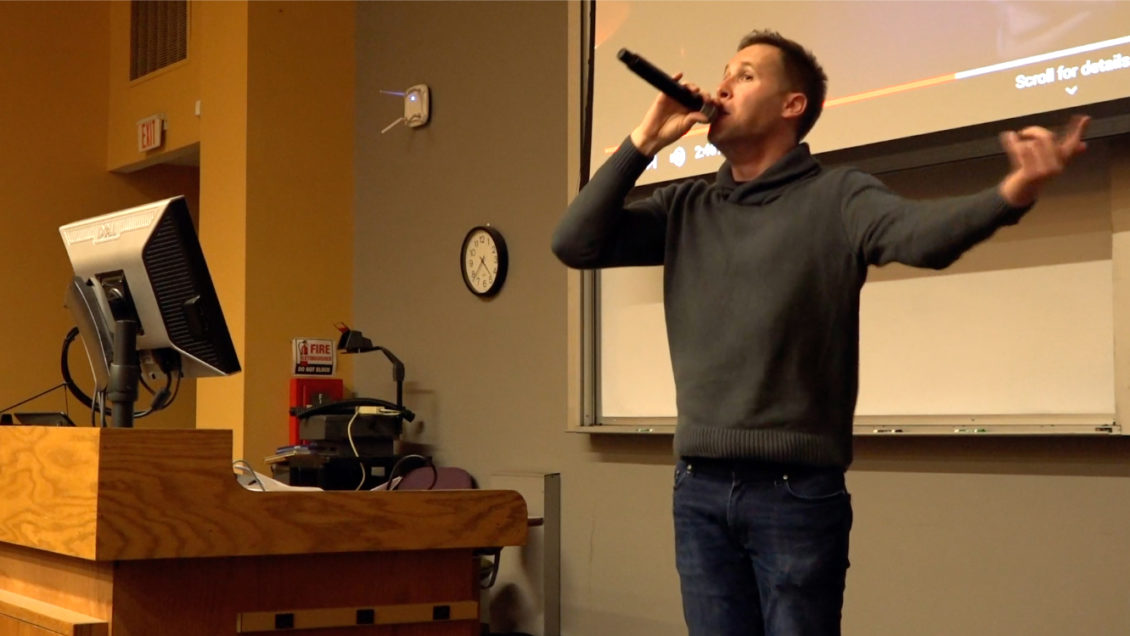It was a cold, dreary Thursday before Thanksgiving break, and his students were tired, but Andrew Mannheimer still received a standing ovation when he dismissed his class. A few of the Intro to Sociology students had already asked him when he might rap in class, and on this particular day they should have seen it coming.
His rap videos on YouTube appear pretty high in Google search results for “Andrew Mannheimer,” so he wasn’t exactly keeping his rap alter ego, Y, a secret. On the day Y took control of the class, Mannheimer was slated to talk about different approaches to education, and the lecture included references to noted scholars that seek to marry hip-hop and the classroom.
Mannheimer showed a video featuring Chris Emdin, one of the scholars he often references, and then he asked if he would have their undivided attention if he rapped. Then he did, at first with no musical accompaniment before launching into a full-fledged performance backed by the sound system in Brackett 100.
“There’s a temptation to tell students ‘pay attention’ or ‘put away the phone,’ but when I was on stage rapping while in college and grad school, I just had to get a crowd’s attention,” Mannheimer said. “What I learned from rapping I apply to the classroom: it’s on me to keep my students engaged.”
Mannheimer began rapping at 12 years old, and by high school he was recording albums solo and with friends that he would sell for $5 apiece. He performed in clubs in college and during grad school, and he even scored a local hit with “Tallahassee,” a song devoted to his hometown.
While pursuing his Ph.D. in sociology at Florida State University, Mannheimer focused his dissertation on teachers’ views and uses of hip-hop culture in secondary education. He even teaches a Sociology of Hip-Hop course that he hopes to continue teaching at Clemson, but his use of the skills he cultivated as an MC aren’t limited to one class.
“There are things I’ve learned that I bring into the classroom or any kind of public speaking,” Mannheimer said. “A great MC captures an audience, and that’s what I have to do when I come into the classroom.”
It’s this innovative approach that makes him engaging. When he paces in front of a crowded lecture hall, he talks fast. He has a microphone in one hand while he gestures with the other; he attacks a lecture like an MC attacks a verse.

He solicits discussion questions or, for larger classes, polls the entire room to get the conversation started. He gets feedback from students who may be hesitant to discuss sociological topics that are controversial by nature. This challenge in class settings both large and small is something that drew Mannheimer to Clemson.
“I liked the size of the classes I was teaching at Florida State, so when I saw this position at Clemson I thought it was a perfect fit,” Mannheimer said. “It’s important for me to figure out ways to ease new students into controversial subjects, just as it’s rewarding to get into deep discussions with students who have been studying these subjects for a longer period of time.”
When Mannheimer first came to Clemson, it was difficult to find venues or opportunities to use his skills outside of the college classroom. That changed when David Holland, a teacher at Liberty High School, invited him to perform at an event put on by the school’s improv group, Walking Shadows. Mannheimer loved working with the school and has committed to perform at future events; he’s even written a song for the improv group and school titled “Give Me Liberty.”

Mannheimer is also toying with the idea of a regular event at Clemson that would resemble the “Freestyle Fridays” that he and his fellow students enjoyed at Florida State. These loosely structured events would last hours and provide students with an opportunity to try out lyrics or freestyle battle. A regular freestyle event would create a space for students with an interest in hip-hop to engage in creative expression and for all students to learn more about the various elements of the culture.
“Sometimes you’ll hear teachers talk about hip-hop and more specifically rap as the spoonful of sugar that helps the medicine go down, but I also think there’s plenty of nutritional value in hip-hop already,” Mannheimer said. “It may be helpful to use Tupac lyrics to help kids understand Shakespeare, but why not view the art of both men as equally important?”
Get in touch and we will connect you with the author or another expert.
Or email us at news@clemson.edu


